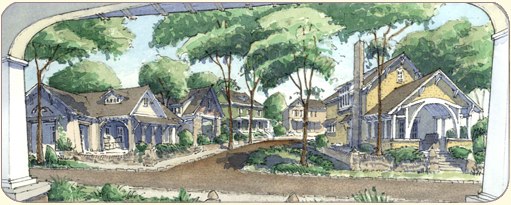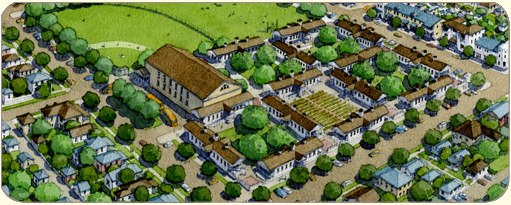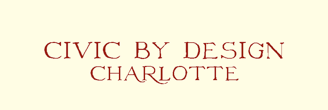
The Light Imprint Initiative was introduced at an Open Space Workshop in conjunction with the Congress of the New Urbanism held in Philadelphia in 2007. Light Imprint is a New Urbanist planning approach that adds a tool box of techniques to manage stormwater and natural drainage. Interest generated at that workshop grew exponentially. We began creating Light Imprint overlays for projects in the planning and construction stages. We assembled a team of experts, led by Low, to publish a limited edition of the first Light Imprint Handbook in 2007. Following an intensive four-month period of international peer review of the Handbook and the associated web site, the Light Imprint team gathered again in August 2008 to edit and compile version 1.3 of the latest Light Imprint Handbook: Integrating Sustainability and Community Design. The Light Imprint Handbook is available through Amazon. Light Imprint has grown and has had a ripple affect on the green infrastructure and storm water management industry as well as the urban design profession for integrating ecology with place-based design.
The Learning Cottage Initiative grew from an informal dinner discussion following a meeting of the Civic By Design Forum, which is chaired by Low. Those attending the dinner were discussing the Katrina cottages proposed as housing replacements for FEMA trailers. The question arose, "Could a similar design replace mobile classrooms at local schools?" Everyone agreed that mobile classrooms used to supplement classroom space are visually unappealing, generally poorly sited, and signify overcrowding. Ideas for a Katrina-inspired Learning Cottage were sketched on paper napkins. The interest generated became the basis for the School Design Workshop held on September 12, 2006. The Learning Cottage was the subject of a Salon held at the Congress for the New Urbanism in Philadelphia in 2007. Since then, we have greatly expanded the scope of the initiative by designing campus plans, alternate classroom plans and elevations, and plans and elevations for gymnasiums and administrative buildings. Learning Cottages have demonstrated flexibility, economy, and environmental advantages and raised the bar for integrating schools with walkable neighborhoods.


Mixopoly provides hands-on design for walkable neighborhoods. Mixopoly is fun, creative, team-building, group-interactive, and especially appealing for non-designers. Participants take a proactive role in creative design for planning communities. Mixopoly helps citizens, leader, professionals, and students to better understand the vital role of physical form in creating healthy sustainably communities through place-based design. Mixopoly can help advance your community building goals including provisions for housing choice, green infrastructure, affordability, cost-savings, and access to daily needs and workplace. This workshop introduces teams to Mixopoly community planning tools which can be applied as design solutions for site specific projects. Participants are welcome to send us photos, maps, sketches, and brief descriptions of potential sites for Mixopoly blocks. Mixopoly workshops continue to be conducted in a variety of venues around the globe. The next Mixopoly Workshop is here.












